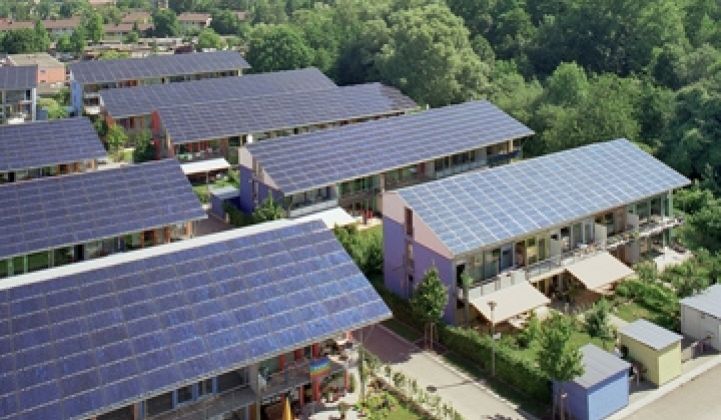A federal election in Germany on Sunday has produced a new set of ruling political parties, but the fate of its popular solar incentive program remains murky.
German Chancellor Angela Merkel's Christian Democratic Union won big along with the Free Democratic Party, which in the past has called for a dramatic cut to the feed-in tariff that has turned Germany into the world's largest solar market.
The Free Democrat Party (FDP) has a strong pro-nuclear power bent, which could lead to energy policies that shifts focus and resources away from solar, said analysts Monday.
Even so, some analysts say it's too early to tell how soon the new coalition would shrink the program and by how much.
"While the FDP is generally anti government subsidy spending, our proprietary contacts suggest that the FDP's position is to monitor the 2010 [feed-in tariff] before it suggests any policy changes (FIT cuts) and if warranted lower the solar FIT for 2011," wrote Jesse Pichel, senior research analyst with Piper Jaffray, in a research note.
Without some clarity on what the new government would do, solar companies and investors could hurry up to get projects completed by the end of 2010 if not much sooner.
"The timing of [the feed-in tariff] changes is impossible to gauge at this point. Expectations of this could drive demand in Germany in 10e (demand pulled-forward)," said Alexander Karnick, an analyst with Deutsche Bank, in a research note. "However, mid-term implications are clearly negative for the sector."
The feed-in tariff policy, which requires utilities to buy solar power at a premium pricing, calls for lowering the solar pricing each year. The idea is that the costs of manufacturing and installing solar energy systems should go down as the market grows.
It was only last year when the government set a pricing schedule for the next few years. The decision came after a big brouhaha over whether it should cut the solar prices by as much as 30 percent (see Solar Prices Set in Germany). The schedule would set a pricing decline of roughly 10 percent per year.
Before the election, chatter from people in the industry raised the possibility of seeing a greater price decline in 2010 than what was in place (see German Solar Incentives in Jeopardy?).
Some political leaders believe the solar industry doesn't need such a hefty subsidy to continue its growth. Fierce competition from Chinese solar panel makers, who have benefited nicely from the solar policy, also has led to a call for a more dramatic cut to the feed-in tariff (see Suntech to SolarWorld: Careful What You Wish For).
The possibility of a sharper cut in 2010 still remains. Solar panel makers have had to cut the selling prices of their products by 30 percent to 50 percent over the past year as the price of silicon dropped significantly. These changes took place after the government revised the feed-in tariff last year.
As a result, those who install solar energy systems and ink power sales contracts this year are due to get a fatter profit than previously expected. This phenomenon could prompt the government to reset the solar pricing sooner.



